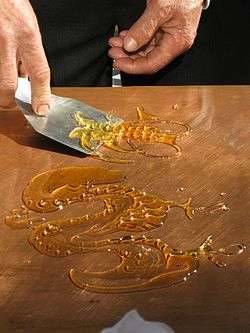Sugar painting

Sugar painting (糖画) is a traditional Chinese form of folk art using hot, liquid sugar to create two dimensional figures. This snack is popular among children. Selecting a figure is normally determined by spinning the arrow on a wheel.[1][2][3][4][5]
History
Sugar painting may have originated during the Ming dynasty when small animals made of sugar were created in molds for religious rituals. This art form then became more popular during the Qing dynasty. After that period techniques improved, and a more diverse range of patterns emerged. In Sichuan, further developments were made in production, seeing the replacement of the molds with the now-common small ladle, often bronze or copper.[6]
Technique

Although techniques vary, normally the hot sugar is drizzled from a small ladle onto a flat surface, usually white marble or metal. The outline is produced with a relatively thick stream of sugar. Then, supporting strands of thinner sugar are placed to attach to the outline, and fill in the body of the figure. These supporting strands may be produced with swirls, zig-zags, or other patterns. Finally, when completed, a thin wooden stick, used to hold the figure, is attached in two or more places with more sugar. Then, while still warm and pliable, figure is removed from the surface using a spatula-like tool, and is sold to the waiting customer, or placed on display.
Figures
Customers (especially children) usually select a figure by spinning the arrow on a wheel which will randomly land on such popular figures as a dragon, fish, monkey, dog, bird, or flower basket.
See also
- Sugar people
- List of Chinese desserts
- List of desserts
-
 Food portal
Food portal
References
- ↑ "消失了的行当:糖画(多图)——福客民俗网". News.folkw.com. 2006-12-26. Retrieved 2012-04-06.
- ↑ "糖画艺人胡师傅 糖画小生意大发展[图]——福客民俗网民俗资讯频道". News.folkw.com. 2007-01-20. Retrieved 2012-04-06.
- ↑ "庙会经济要有核心竞争力 糖画一天净挣500元-世界经理人情报-http". //bi.icxo.com. 2008-01-22. Retrieved 2012-04-06. External link in
|publisher=(help) - ↑ "伤水:"糖画"的启示". Sunpoem.com. 2011-05-27. Retrieved 2012-04-06.
- ↑ "四川糖画 _特色文化_天府文化_四川省档案局". Scsdaj.gov.cn. Retrieved 2012-04-06.
- ↑ 董庆沛 (2012-03-14). "A sweet art — sugar painting". China.org.cn. Retrieved 2012-04-06.
External links
-
 Media related to Sugar painting at Wikimedia Commons
Media related to Sugar painting at Wikimedia Commons - Images
- Images
- Video
